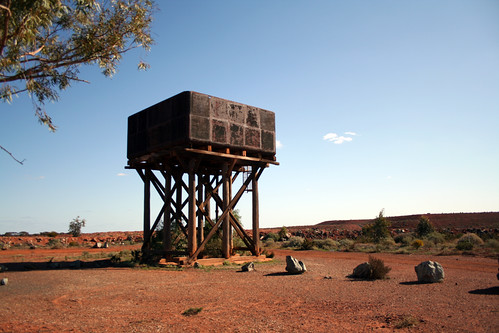Cheap fresh water for Queensland country towns using geothermal heat
Posted by Big Gav in desalination, geothermal energy, low temperature geothermal power, queensland
The University of Queensland thinks that geothermal energy could be used to produce fresh water via reverse osmosis in the outback - Cheap fresh water for Queensland country towns using geothermal heat.
An underground source of hot-rock energy may have the potential to produce low-cost fresh water, according to The University of Queensland's Queensland Geothermal Energy Centre of Excellence.
The Centre's research has found that Queensland has ample geothermal energy resources to power thermal desalination plants and provide clean water for small towns suffering from water shortages.
Centre Director Professor Gurgenci said the geothermal-powered desalination systems could play a pivotal role in helping ease the water crisis facing small towns.
“This may not be the solution for large-scale desalination needed for cities like Brisbane, but should have a significant contribution in smaller towns like Dalby and Maleny, which have recently experienced extreme water shortages,” he said.
“Overseas experience suggests that these systems can be scaled up to provide 10 to 20 kilolitres of water per day while also helping greenhouse plant growing.”
Queensland's geothermal resources range from high-temperature Hot Fractured Rock (HFR) of the Cooper, Eromanga and possibly Drummond Basins to Hot Sedimentary Aquifiers (HSA) of the Great Artesian Basin.
Professor Gurgenci said that while some of these resources may not be hot enough for electricity generation, they would be a perfect fit for thermal desalination of underground brackish aquifers.
“Australian emphasis so far has been on large-scale desalination using reverse osmosis technology although an overwhelming fraction of desalination around the whole is done by thermal means,” Professor Gurgenci said.
“Studies indicate that for plants in the range of one to 100 megalitres per day, thermal desalination technologies are more suitable than reverse osmosis especially if there is a cheap and abundant supply of heat.
“A geothermal-powered desalination plant in that range can easily provide the entire fresh water needs for an outback city at the cost of around 80 cents to $1.60 per kilolitre.”
The estimated cost developed by the Centre's researchers significantly undercuts the 2010/2011 bulk water prices of $1.00 to $2.00 per kilolitre outlined by the Queensland Water Commission.






